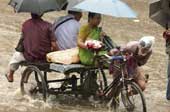 |
| Floating filth |
Aug. 19: Hotels, restaurants and car wash service centres are the latest entries in the long list of water pollutants in the city.
Twenty per cent of the waste that pollutes water bodies in the city originate in hotels and restaurants, Eastern Envo Protect, a city-based environment protection society, has found out during its recent survey.
Now, the organisation has decided to approach Kamrup district (metro) administration and the Pollution Control Board, Assam, to penalise commercial establishments that are causing largescale water pollution by releasing untreated waste.
“The oil and grease — the primary waste material released from hotels, restaurants and car washing centres are polluting our waterbodies,” said S.R. Hassan, deputy general manager of Eastern Envo Protect.
“Samples collected from various waterbodies, including the Brahmaputra, Deepor Beel and Bharalumukh, have clearly indicated that 20 per cent of the waste matter comes from these three sources,” he added.
Though a team from the environment group visited various hotels and car washing centres to ask them to adhere to and adopt pollution control measures, the requests have gone unheeded.
“Now we are left with no other option but to approach the authorities to penalise those who are flouting the norms,” said Hassan.
All that the hotels, restaurants and car washing centres need to do, the organisation insists, is introduce separators. This simple and cost-effective device separates oil, grease and other pollutants from the waste matter released.
“We are even ready to help them technically to build simple, low-cost and effective measures to tread the eco-friendly path,” said Hassan.
According to the findings of the environmental group, sewage originating from kitchens, bathrooms, and laundry sources, waste from food preparation, dishwashing, garbage-grinding, toilets, baths, showers, and sinks are the main polluting sources for waterbodies.
They amount to little in terms of weight, but contain organic material and plant nutrients — food and vegetable waste — that tend to rot. This waste, if not treated, is also likely to become storehouses of disease-causing microbes.
“The various substances that we use for keeping our houses clean add to water pollution because they contain harmful chemicals. Most detergents and washing powders contain phosphates, which are used to soften the water, among other things. These and other chemicals contained in washing powders affect the health of all forms of life in the water. When sewage enters a lake or stream, micro organisms begin to decompose the organic material,” said Hassan.
The organisation now only hopes its efforts are acknowledged at least by the authorities.











